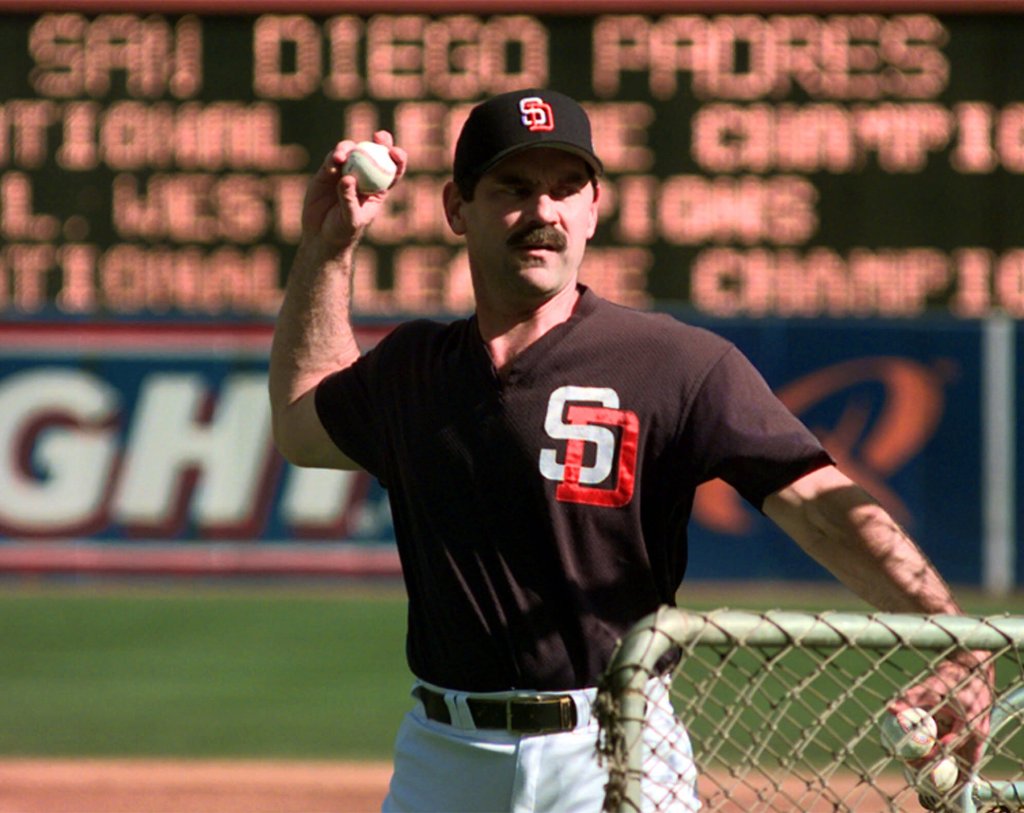With Bruce Bochy back in town and a number of dear Padres fans losing their minds during the recent 2-4 roadtrip, it’s a good time to board the nostalgia train for a quick pick-me-up trip.
Let’s revisit July 1998.
“We had so much fun,” Dave Stewart said Thursday, reminiscing about a talent-rich Padres club that, in contrast to most Padres squads before it, didn’t have to try to convince itself it could keep up with the big boys.
The ‘98 Padres had a rare camaraderie, said Stewart, the pitching coach.
Though a jaunt to 98 wins and the National League pennant will do wonders for any team’s morale, Stewart said the players shared a pervasive mutual respect that’s still evident, via group texts and get-togethers.
“We didn’t have any bad characters on that team,” said Stewart, who pitched for three World Series champions in a 16-year career. “We had a bunch of winning-type players on that team.”
Bochy was a plain-speaking, poker-playing, wry baseball expert who’d gathered wisdom as a husband, father and former big-league catcher and third-base coach.
This was his fourth Padres team. Although the pressure on it was immense — Padres ownership was eager to get public money toward a downtown ballpark via citizens’ vote that November — Bochy knew how to keep the players loose. The players appreciated Bochy’s authenticity and high-level baseball chops.
“His communication and relationship with his players was unlike any that I ever witnessed with any manager,” said Stewart, a 1989 World Series MVP who pitched under Hall of Famers Tommy Lasorda and Tony La Russa and two-time World Series champion manager Cito Gaston, an original Padre. “It’s trust, of course, that’s first and foremost. When you have that type of relationship with your players, players will play well for you, they’ll give you the best they’ve got every day and he had that from the guys.”
By the 86-game mark — where the current Padres stand entering Friday’s series opener against Bochy’s Rangers — the ‘98 Padres had set themselves up to roll to the franchise’s first playoff berth in 12 years.
At 55-31, Bochy’s club stood atop the NL West, 4 1/2 games ahead of Dusty Baker’s Giants. They were coming off a 4-2 victory in Mission Valley that featured seven innings from pitcher Joey Hamilton, home runs by Steve Finley and Carlos Hernandez and a key double by Ken Caminiti.
The 86th game was memorable for Tony Gwynn drawing three walks. He wouldn’t do that again, leaving him with only seven three-walk games in a 20-year career. Hey, if you can swat a ping-pong ball in a windstorm, it’s not easy to take walks.
Protecting the 4-2 lead, Bochy had Ruben Rivera play right field in the ninth inning.
14 Oct 1998: Manager Bruce Bochy of the San Diego Padres hugs outfielder Steve Finley after the Padres defeated the Atlanta Braves during game six of the National League Championship Series at Turner Field in Atlanta, Georgia. The Padres defeated the Braves 5-0. Mandatory Credit: Doug Pensinger/ALLSPORT
Rivera was one of the odder characters in Padres history. As a Yankees minor leaguer, the outfielder’s speed and power drew Mickey Mantle comparisons from the New York media hype machine.
What wasn’t reported was Rivera’s aversion to pitches coming near him, a trait that’s fatal to long-term hitting success. Rivera was indeed powerful. One afternoon in Philadelphia, hitting coach Merv Rettenmund had Rivera take batting practice in empty Veterans Stadium. To begin the session, Rettenmund flipped “soft-toss” offerings from beyond the other batter’s box.
Rivera clouted one into the upper deck. “I’ve never seen anything like that,” Rettenmund said. Unfortunately for “The Great Rubeno,” as Rettenmund dryly called him, big-league pitchers didn’t throw soft-toss.
Bochy trusted Rivera as Gwynn’s defensive replacement throughout the season and was rewarded for it as Gwynn, 38, logged 500-plus plate appearances that year despite painful ailments.
Jim Leyritz was another interesting role player on that star-laden team
In June, Kevin Towers traded for the right-handed hitter, who’d hit a big home run the 1996 World Series, igniting the Yankees.
Leyritz provided the ‘98 Padres with crucial walks and hits, including a home run off Houston’s Randy Johnson in the playoffs. In pressure moments, Leyritz had a knack for making it seem like the pressure was on the pitcher. It wasn’t until the following year that he and Gwynn would have a fallout.
In that 86th game, Leyritz drew a bases-loaded walk as a pinch-hitter, improving his OPS to .915. In the postseason, he hit four home runs in 13 games.
By September, the Padres were 41 games over .500. It remains the franchise’s high-water mark within a season.
Nostalgic reminiscing is fun, but it shouldn’t obscure the gifts of the present.
The 2025 Padres have stretched the franchise’s best run of playoff contention, now at six seasons. Their manager, Mike Shildt, lauded by Padres players for his attention to detail, is 11-6 against Bochy dating to Shildt’s Cardinals tenure.
Today’s baseball era is loaded with stunning talent, headed by Japanese star Shohei Ohtani. To pick one local example of this era, Rettenmund — who died in December — was often in awe of Manny Machado, saying he’d never seen a better third baseman. Early in Machado’s career, Bochy mused that Machado already might be baseball’s best player.
But for their own era, the ‘98 Padres were hot stuff.
Originally Published: July 3, 2025 at 5:53 PM PDT
